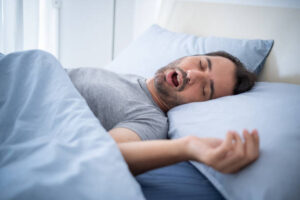 Obstructive sleep apnea is a common condition caused by a blockage in the upper airway. The soft tissues in the back of the throat or the tongue can collapse to restrict breathing while sleeping. This could result in hundreds of pauses in breathing every night, with each event lasting for 1 minute or longer. With no treatment, you can be at risk of potentially life-threatening complications. Here are 5 mistakes that could be making your sleep apnea symptoms worse.
Obstructive sleep apnea is a common condition caused by a blockage in the upper airway. The soft tissues in the back of the throat or the tongue can collapse to restrict breathing while sleeping. This could result in hundreds of pauses in breathing every night, with each event lasting for 1 minute or longer. With no treatment, you can be at risk of potentially life-threatening complications. Here are 5 mistakes that could be making your sleep apnea symptoms worse.
1. Weight Gain
70% of patients with obstructive sleep apnea are overweight. Obesity is known to increase the risk of the condition because it puts more weight on the airway. A large neck circumference is also a culprit of sleep apnea, which can coincide with weight gain.
Researchers have found that losing weight can reduce or even eliminate sleep apnea symptoms. Eat plenty of nutritious foods and get regular exercise to maintain a healthy weight.
2. Certain Medications
Some medications are known to cause sleep apnea episodes, which include:
- Muscle Relaxants
- Benzodiazepines
- Painkillers
- Sleep Aids
Although they may increase the prevalence of breathing disturbances, do not stop taking any prescribed medications without first consulting with your physician.
3. Sleeping on Your Back
Sleeping on your back puts extra weight on your chest and neck. Sleep specialists recommend changing your position to make it easier to breathe.
It’s best to sleep on your side. If you have difficulty staying in this position, place pillows behind your back to prevent you from rolling over.
4. Alcohol
Alcohol causes your muscles to relax, which can lead to breathing disturbances from your airway collapsing. It’s best to avoid alcohol, especially 4 to 5 hours before going to bed. Moderate your consumption to reduce the harmful effects of alcohol.
5. Age
Age is known to increase your risk of sleep apnea. Unfortunately, you can’t stop the aging process. It’s important to watch for any signs of sleep apnea and seek appropriate treatment.
Options to Treat Sleep Apnea
Besides changes at home, you have multiple options to treat sleep apnea, including:
- CPAP: A CPAP machine is the most traditional treatment for sleep apnea. Gentle air pressure is delivered through a mask worn over your mouth or nose to prevent pauses in breathing.
- Oral Appliance: An oral appliance can be used along with a CPAP or as an alternative to the machine. The custom-fit appliance trains your jaw and tongue to rest in a more comfortable position to keep your airway open.
If you struggle with daily fatigue, difficulty concentrating, high blood pressure, or chronic snoring, you may be experiencing symptoms of sleep apnea. With the right changes at home and complying with your treatment plan, you can improve your health and quality of life with a good night’s rest.
About Dr. Ali Fulreader
Dr. Fulreader earned her dental degree from the University of Maryland and has completed advanced education in cosmetic dentistry, CEREC, and sleep dentistry. She is a member of several professional organizations, including the American Dental Association. Request an appointment through her website or call her office at (847) 908-5566.
